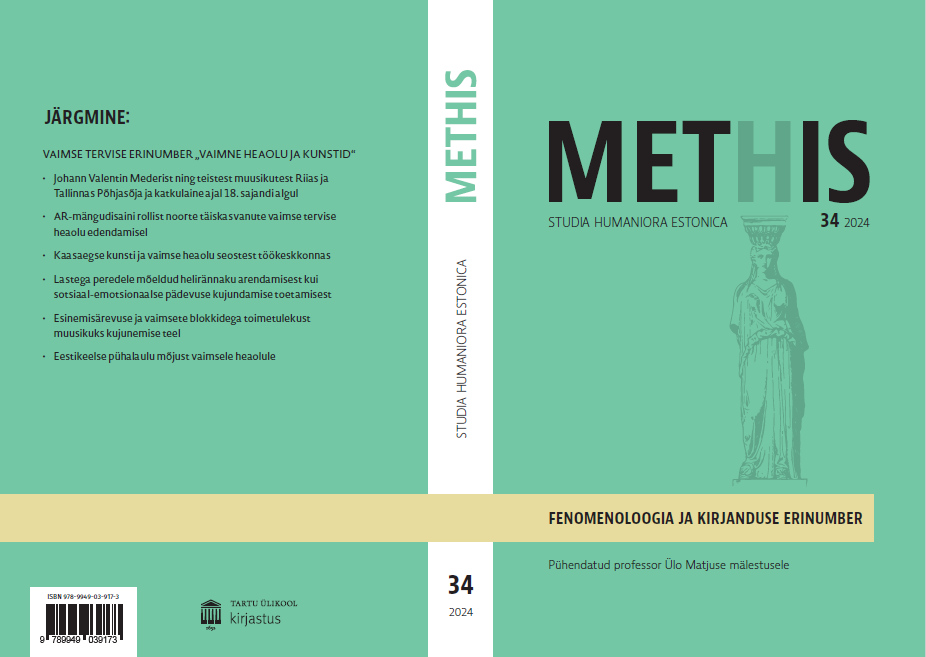Ülo Matjus fenomenoloogilise mõtlemise teil / Ülo Matjus on the Paths of Phenomenological Thinking
DOI:
https://doi.org/10.7592/methis.v27i34.24696Keywords:
Ülo Matjus, fenomenoloogia, fenomenoloogiline filosoofia, esteetika, Roman Ingarden, Edmund Husserl, Martin Heidegger, Hans-Georg Gadamer, Leonid Stolovitš, phenomenology, aestheticsAbstract
Teesid: Käesolevas artiklis annan ülevaate filosoofiaprofessor Ülo Matjuse (1942–2023) fenomenoloogilisest mõtlemisest ja tegevusest. Kirjeldan Matjuse kujunemisteed fenomenoloogina, vaatlen tema kirjutatud fenomenoloogia-alaseid tekste, konverentsiettekandeid ning loenguid fenomenoloogilisest filosoofiast. Ülo Matjus oli 1970. aastatest alates üks esimesi fenomenoloogilise filosoofia uurijaid Balti riikides. Ta oli fenomenoloogilise ja olemisajaloolise mõtlemise maaletooja Eestis, selle tõlkija ning õpetaja. Matjuse fenomenoloogia-alane tegevus ei piirdunud aga ainult Eestiga. Ta oli 1970. aastatel seotud Riia fenomenoloogide ringiga ning pidas ettekandeid ka Saksamaal, kohtudes saksa filosoofi Hans-Georg Gadameriga (1900–2002). Ülo Matjuse fenomenoloogia-alased tõlked ja artiklid jäävad kestma ning õpetused jätkuvad tema õpilaste kaudu.
The article introduces professor of philosophy, Ülo Matjus (1942–2023) as a phenomenological thinker. Matjus was a professor of philosophy at the University of Tartu from 1992 to 2015. His research was mainly focused on Roman Ingarden’s (1893–1970), Edmund Husserl’s (1859–1938), and Martin Heidegger’s (1889–1976) philosophy, but he also investigated Estonian intellectual history and was an avid bibliophile. He prepared the establishing of the Chair of Intellectual History at the University of Tartu and also studied Estonian book history and published several articles on the topic.
This article focuses on Ülo Matjus as a phenomenologist. Ülo Matjus was one of the first phenomenological thinkers and researchers of phenomenological philosophy in the Baltic States in the 1970s and also a member of the Latvian Circle of Phenomenology in the same time period. Matjus started his phenomenological journey in the Soviet Union in the 1970s when Estonia was one of its parts. His earlier articles were written in Russian due to the Russian occupation and the restrictions posed by it in the Baltic States. These—for example the article ‘The Problem of the Being of “Material Things” in E. Husserl’s Phenomenology’ (1988) introduced Roman Ingarden’s and Edmund Husserl’s phenomenological thinking to the Soviet intellectuals. His doctoral dissertation was also written in Russian, and was concerned with Roman Ingarden’s aesthetical views on art—its title is The Problem of Intentionality in Roman Ingarden’s Aesthetics. The thesis was supervised by professor Leonid Stolovitš (1929–2013) and defended in Riga, Latvia in 1975.
Since the 1990s when Estonia restored its independence, Matjus could concentrate more on Martin Heidegger’s thinking. He had an opportunity to meet and talk with Heidegger’s student, the philosopher Hans-Georg Gadamer (1900–2002) in Bonn (in Bad Godesberg) on the symposium ‘On Heidegger’s Philosophical Relevance’ (1989). Matjus participated in the event as a scholarship holder for the Alexander von Humboldt’s Foundation and gave a presentation (Matjus [1989]2004b, 313). In 1993 Matjus also had a conversation with Martin Heidegger’s son Hermann Heidegger (1920–2020) about translation of Martin Heidegger’s Introduction to Metaphysics into Estonian (Matjus 1999, 278–280).
Matjus translated several phenomenological texts, for example Heideggers Introduction to Metaphysics and The Origin of the Work of Art into Estonian (1999 and 2002, respectively) and wrote afterwords to the translations. He also translated some articles and presentations by Heiddeger, for example ‘The End of Philosophy and the Task of Thinking’ (Estonian in 1989), ‘A Question about Technique’ (1989), ‘Creative Landscape. Why we Stay in Province’ (1989), ‘Spiegel’s Conversation with Martin Heidegger’ (1992) and ‘Phenomenology and Theology’ (1994). He also translated Edmund Husserl’s The Paris Lectures (1993), to which he wrote an introduction entitled ‘Edmund Husserl on the Paths of Descartes’.
Matjus taught several courses on phenomenology at the University of Tartu since the 1990s and attended conferences both in Estonia as well as in Latvia and Germany. For example, in 1995/1996–2001/2002 he gave a lecture course “The Basics of Aesthetics” (later “Aesthetics” and “Aesthetics II”) at the University of Tartu, which introduced traditional European philosophical aesthetics and Heidegger’s non-metaphysical aesthetics from The Origin of the Work of Art. In addition, Matjus gave lecture courses entitled ‘Development of Phenomenology and its Basic Problems’ in 1997/1998 and 1999/2000 and ‘Phenomenology from the Estonian Perspective’ (2012/2013, 2013/2014 and 2015/2016).
Matjus also gave presentations on phenomenological philosophy, for example, ‘On the Interdisciplinary Origin of Phenomenology’ (2014) and ‘On the Benefits and Harms of Intentionality’ (2010) at the Annual Conferences of Estonian Philosophy. Some of his students have also studied phenomenology—Margit Sutrop (b. 1963), Anne Kokkov (1960–2017) and Juhan Hellerma (b. 1986) wrote their MA theses about phenomenology.
Matjus also applied a phenomenological and open-minded attitude (i.e. an attitude without prejudice) in his life. As a professor and phenomenologist, he warned his students what to beware of, and toward which one must hold on to, which is part of phenomenological attitude, but let them stay themselves at the same time. He had respect for his students. He was very supportive and at the same time taught them that you have to find your own way. His teachings now live on through his students.


